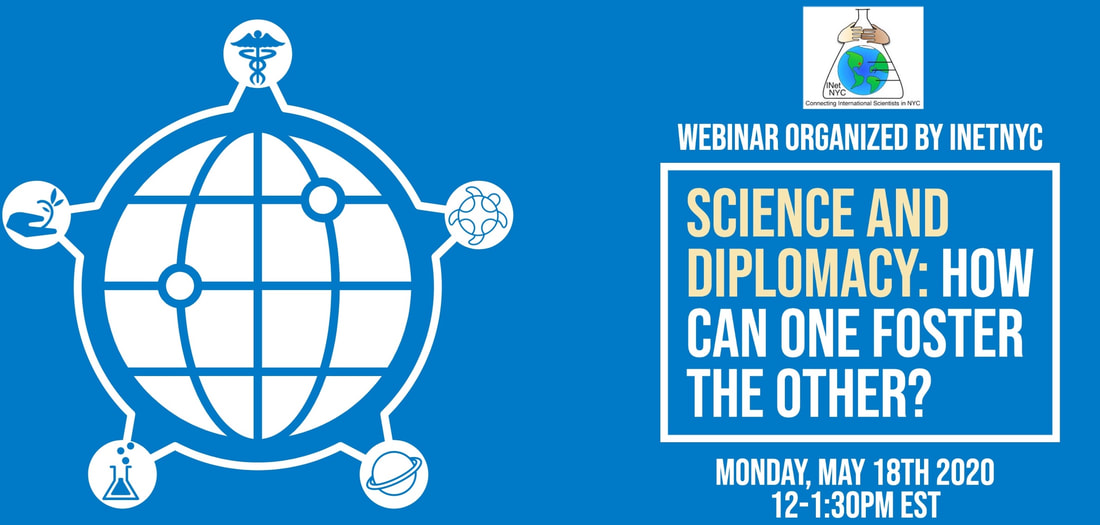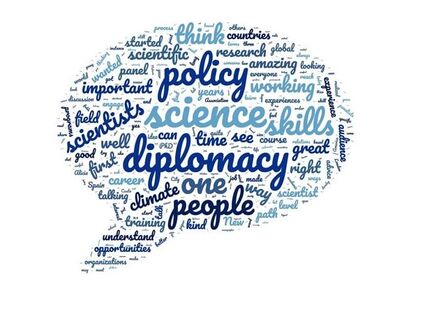|
Words by Ipshita Zutshi Edited by Laurie Herviou & Conchi Izquierdo Climate change, deadly pandemics and diseases - the argument is often made that the world now, more than ever, is in dire need of scientifically-driven policy making strategies. While true, we would argue that the world has always needed science diplomacy, and moreover, there have always been highly talented professionals navigating these uncharted waters of what we now call science diplomacy. With an increasing push to standardize this profession to make it a more linear path, INet NYC organized a career development panel discussion on Monday, May 18th, 2020, called “Science Diplomacy: how one can foster the other?”. The event was spearheaded by INet NYC board member Laurie Herviou, a postdoctoral researcher at Memorial Sloan Kettering Cancer Center, and brilliantly moderated by Alessandro Allegra. The invited panelists included Dr Alicia Pérez-Porro, Dr Lorenzo Melchor, Dr Melania Guerra, Dr Jean-Christophe Mauduit, Dr Marga Gual Soler, and Dr Jessica Tome Garcia (Detailed bios for each of the panelists are provided at the bottom of this article). The outcome of their efforts is a goldmine of information for opportunities to transition to a career in science diplomacy. We hope that you can walk away (or rather, scroll away) having learnt a little more about this truly exciting profession. You can also watch the full video of the discussion here - https://www.youtube.com/watch?v=ux25ANzPm1c. We used the transcript of the panel discussion to generate a word cloud of the most commonly used terms during the discussion (using www.wordclouds.com). Check out the buzzwords in this field!
So what is science diplomacy? As Alessandro perfectly summarized, “science diplomacy is an umbrella-term that means different things to different people”. He explained that those pursuing science diplomacy often are “hybrid creatures'' of sorts, developing multiple skills and juggling various responsibilities. They hail from various backgrounds, often starting off as scientists, diplomats or social scientists, and perhaps because of this diversity, the very definition of science diplomacy is quite amorphous. Broadly however, all our panelists defined science diplomacy as the interactive medium by which academia, governments, international institutions, private companies, NGOs and regional organizations all connect using science as the common language. As for why the world needs science diplomacy, we highly resonate with the opinion voiced by Jessica, “I don't understand global development without science. I don't understand sustainable development without science. And I don't understand governments without scientists in their parliaments.” What motivated you to pursue science diplomacy? The most consistent drive towards a career in science diplomacy was the general feeling of being “trapped in academia”. For almost all the panelists, there came a turning point in their career, either at the end of their PhDs, or during their post-doc, where they began to question the impact of the work they do - “I felt I was staring into the wall of a cave without being totally aware of how vast the world is”, or “I didn’t want to spend my time in front of a microscope in a dark room alone”, were some phrases heard. Some of the panelists such as Alicia and Melanie described their turning points as “Aha!” moments where certain experiences made everything click for them (Admittedly, their jaw-dropping experiences in Antarctica or in the Bering Strait certainly sounded Aha-worthy). Other panelists such as JC and Lorenzo described this process as a more gradual process of self-discovery, from a course taken, or exposure through volunteering at an organization, that slowly shaped their path. How did you start your career in science diplomacy? Given how diverse and multi-faceted the field of science diplomacy is, it is perhaps unsurprising that the paths taken by our panelists were equally varied. For most of our panelists, fellowships (most of them UN-based fellowships), Royal Societies, workshops and field trips acted as the first steps to transitioning to a career in science diplomacy (For a comprehensive list of these fellowships, scroll down to the ‘useful links and resources section’). Almost all panelists also highlighted the role of mentors in this process, where often finding the right mentor is the first step towards learning how to make this transition. A crucial point raised by Alessandro, JC and Marga, is that this process is not necessarily always linear. It sometimes becomes necessary to take a few steps back, to pursue a masters degree, or an unpaid internship, after already having received a PhD. In fact almost all our panelists went on to complete their master’s degrees in policy after their PhDs, because those programs would give them the necessary visibility and knowledge of the international framework. All the panelists stressed however, that these temporary pauses should not be looked at as setbacks, and that these courses are well worth the extra time. Furthermore, there are now greater efforts to make this career path more linear with more streamlined courses and trajectories available. Given the variety of trajectories one can take to transition, we understand that decision for the ‘right’ path can seem quite overwhelming. Here, we hope that JC’s advice may provide some respite, “It is important to remember that there is no one skill, or one clear educational pathway or trajectory to follow. The field is constantly being defined, and the way to teach knowledge and skills will also continue to be shaped and refined in the coming years.” What skills help for a successful career in science diplomacy? Perhaps the most common advice given by our panelists was to cultivate the ability to communicate. As Melanie rightly said, “If you have the ability of simplifying the science, dealing with the uncertainty around predictions, and maneuvering them into something that can actually lead to action for the policymakers, that is one of the biggest strengths that you can have.” This advice was backed up by Lorenzo who also recommended that one must have, “Entrepreneurship creativity and the ability to multitask because you’ll have to develop quite a lot of projects at once”. Our panelists also recommended developing “soft-skills”. As Jessica mentioned, “It is very important to never underestimate a person and instead try to understand what their culture and passion is and always have an open mind.” Similar opinions were voiced by Marga who told us, “In this field, it is not only important what you know, but also how you say it and whether you respect protocol and know that there’s an order and hierarchy that must be followed.” Resilience was another skill that our panelists repeatedly recommended. As Jessica described, “There are many many skills needed, some of which we have already gained as a scientist because we think and we learn how to be resilient.” This rang soundly with Alicia’s advice - “It is very useful to be able to leave your comfort zone and feel comfortable being uncomfortable”, Alicia also mentioned that her ability to connect things that people don't see the connection between - a scientific paper, an international policy, a local NGO, and to find ways to bring these seemingly different things together has paid off really well in this profession. What if I’m not ready to transition to a career in science diplomacy? We understand that many of our readers care deeply about science diplomacy, and want to look for ways to contribute without completely switching career paths at this moment. We’d like to highlight a key point made by Lorenzo, “You can keep doing research but with a different mindset that your research needs to have some kind of impact at the policy or diplomacy level. To do that you engage in specific meetings, have different international conferences, or different policy gatherings to provide your scientific expertise so that science has an impact in policy and diplomacy.” Several organizations such as the Royal Society, Sense about Science, Campaign for Science and Engineering, and professional societies or networks (Psst...INet-NYC is looking for volunteers) are ideal platforms to engage with science diplomacy as an active researcher. Needless to say, keep engaging with us and our panelists on Twitter, Instagram and Linkedin, and keep the conversation going! We would like to end with the inspiring advice given by Alicia, “when in doubt, just keep swimming”. It may seem like a daunting task but if you stay focused and take things one step at a time, you are sure to achieve success and find a way to navigate these waters. Useful links and resources:
0 Comments
|
Archives
May 2025
Categories
All
|


 RSS Feed
RSS Feed